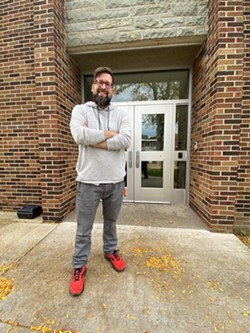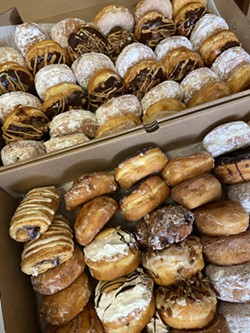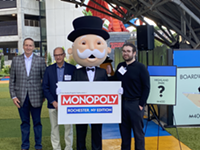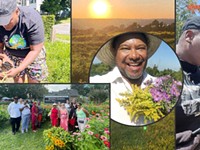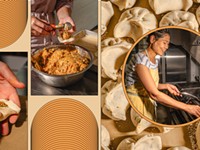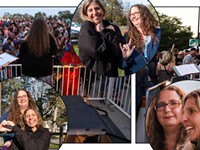[
{
"name": "500x250 Ad",
"insertPoint": "5",
"component": "15667920",
"parentWrapperClass": "",
"requiredCountToDisplay": "1"
}
]
The freezer is empty at the newly opened food pantry on the Rochester School for the Deaf campus, but Zachary Ennis remains upbeat.
"It was full last week," he said. "There's more coming."
Ennis, founder and executive director of Rochester Deaf Kitchen, sees the emptiness as both a sign of the pantry's early success and evidence of its ongoing need.
The 34-year-old, who is also Deaf, first envisioned the pantry in 2011 while still in college, inspired by his own youthful experience with food insecurity. He wrote “Deaf Community Food Pantry” on a piece of paper and stuck it to the fridge for inspiration. But in December 2015, Ennis was diagnosed with Hodgkin's lymphoma, and he spent the next several years focused mostly on survival. He underwent a stem cell transplant at New York's Memorial Sloan Kettering Cancer Center on March 6, 2018, a date he now considers his "immune system's birthday."
"I'm going to celebrate two birthdays every year for the rest of my life," he said. He spent his recovery time at home raising his son, Brendan, with partner Dr. Donna Guardino, a therapist who is also Deaf. Now in third grade, Brendan was just eight months old when his dad was first diagnosed.
"Sometimes it felt as if we took care of each other," said Ennis, who went into remission in September 2019. It would be another three years before he "finally felt healthy and myself again." Now, he’s using his second chance to make the food pantry a reality.
The Rochester Deaf Kitchen opened August 30, and in its first six weeks, it had more than 1,300 unique visits. As a separate organization with its own 501c3 status, the pantry operates out of donated space behind the deaf school's soccer field and welcomes visitors twice a week.
Ennis credits the early success to community organizations, volunteers and donors. He gives special thanks to RSD superintendent Antony McLetchie and Foodlink's Mitch Gruber.
Gruber, the organization's Senior VP and Chief Impact Officer, said as soon as he met Ennis, it was clear that he was a change agent.
“(He wants) to help serve the most vulnerable members of the deaf community,” said Gruber. "The communities we serve are fluid and it’s really important that we have partners who help us reach underserved populations."
Though some might assume food pantry items are donated, Ennis explained that he needs to purchase much of what is given out. Fortunately, the pantry benefits from the purchasing power of Foodlink. For example, a case of spaghetti that might cost $39.80 in a store can be purchased for just $12.88.
So far, Ennis has acquired 8,350 pounds of food items and hygiene products for $2,233.38, and he can purchase items donated to Foodlink for just 19 cents per pound.
"This is my favorite," he said. "For less than $50, we can have hygiene products of over $1,000 in retail value."
Food also arrives through canned food drives, but "at times, we have had to throw out more than we could keep" due to expiration dates going back to 2017.
Golden Harvest Bakery & Cafe on Jefferson Road in Henrietta has been a major supporter, supplying more than 1,000 pounds of food. Ennis calls their donated donuts, bread, cheese and soup a "game changer."
Joel Reed owns the bakery with his wife, Emily.
"We are more than glad to share our baked goods instead of letting them sit and expire," he said.
Ennis believes it’s important for Deaf people to have their own food pantry, rather than just go to any other local pantry.
“What is different is the environment, the communication, the ease of access that gives Deaf people a taste of what hearing people experience on a daily basis," he said. "They can ask questions, make suggestions and be themselves, as opposed to being 'that deaf person' everywhere else."
To find other area food pantries, soup kitchens, and meal programs, visit Foodlink's interactive map: foodlinkny.org/find-food.
Feedback about this article can be directed to [email protected].
"It was full last week," he said. "There's more coming."
Ennis, founder and executive director of Rochester Deaf Kitchen, sees the emptiness as both a sign of the pantry's early success and evidence of its ongoing need.
The 34-year-old, who is also Deaf, first envisioned the pantry in 2011 while still in college, inspired by his own youthful experience with food insecurity. He wrote “Deaf Community Food Pantry” on a piece of paper and stuck it to the fridge for inspiration. But in December 2015, Ennis was diagnosed with Hodgkin's lymphoma, and he spent the next several years focused mostly on survival. He underwent a stem cell transplant at New York's Memorial Sloan Kettering Cancer Center on March 6, 2018, a date he now considers his "immune system's birthday."
"I'm going to celebrate two birthdays every year for the rest of my life," he said. He spent his recovery time at home raising his son, Brendan, with partner Dr. Donna Guardino, a therapist who is also Deaf. Now in third grade, Brendan was just eight months old when his dad was first diagnosed.
"Sometimes it felt as if we took care of each other," said Ennis, who went into remission in September 2019. It would be another three years before he "finally felt healthy and myself again." Now, he’s using his second chance to make the food pantry a reality.
The Rochester Deaf Kitchen opened August 30, and in its first six weeks, it had more than 1,300 unique visits. As a separate organization with its own 501c3 status, the pantry operates out of donated space behind the deaf school's soccer field and welcomes visitors twice a week.
Ennis credits the early success to community organizations, volunteers and donors. He gives special thanks to RSD superintendent Antony McLetchie and Foodlink's Mitch Gruber.
Gruber, the organization's Senior VP and Chief Impact Officer, said as soon as he met Ennis, it was clear that he was a change agent.
“(He wants) to help serve the most vulnerable members of the deaf community,” said Gruber. "The communities we serve are fluid and it’s really important that we have partners who help us reach underserved populations."
Though some might assume food pantry items are donated, Ennis explained that he needs to purchase much of what is given out. Fortunately, the pantry benefits from the purchasing power of Foodlink. For example, a case of spaghetti that might cost $39.80 in a store can be purchased for just $12.88.
So far, Ennis has acquired 8,350 pounds of food items and hygiene products for $2,233.38, and he can purchase items donated to Foodlink for just 19 cents per pound.
"This is my favorite," he said. "For less than $50, we can have hygiene products of over $1,000 in retail value."
Food also arrives through canned food drives, but "at times, we have had to throw out more than we could keep" due to expiration dates going back to 2017.
Golden Harvest Bakery & Cafe on Jefferson Road in Henrietta has been a major supporter, supplying more than 1,000 pounds of food. Ennis calls their donated donuts, bread, cheese and soup a "game changer."
Joel Reed owns the bakery with his wife, Emily.
"We are more than glad to share our baked goods instead of letting them sit and expire," he said.
Ennis believes it’s important for Deaf people to have their own food pantry, rather than just go to any other local pantry.
“What is different is the environment, the communication, the ease of access that gives Deaf people a taste of what hearing people experience on a daily basis," he said. "They can ask questions, make suggestions and be themselves, as opposed to being 'that deaf person' everywhere else."
To find other area food pantries, soup kitchens, and meal programs, visit Foodlink's interactive map: foodlinkny.org/find-food.
Feedback about this article can be directed to [email protected].
